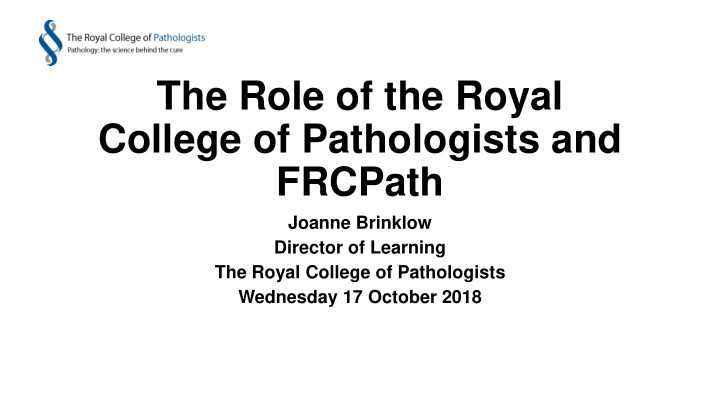



The Role of the Royal College of Pathologists and FRCPath Joanne Brinklow Director of Learning The Royal College of Pathologists Wednesday 17 October 2018
The Royal College of Pathologists The College is a professional membership organisation with charitable status, concerned with all matters relating to the science and practice of pathology. It is a body of its Fellows, Affiliates and trainees, supported by the staff who are based at the College's London offices.
RCPath London offices…
The Royal College of Pathologists The College's Royal Charter, Ordinances and By-Laws define the objectives of the College as: • To advance the science and practice of pathology • To further public education in the field of pathology • To promote study and research in pathology and disseminate the results The College has no regulatory authority.
Training Curricula Higher Specialist Scientific Training (HSST) curricula must be approved by the Education and Training Scrutiny Group of Health Education England (HEE) before they are published. Clinical scientist specialties are identified by ‘HSST’ appearing next to the relevant specialty.
FRCPath Examinations Part 1 – Test of knowledge Part 2 – Test of practical application of knowledge
FRCPath examinations • Two sessions a year – Spring and Autumn • Applications period – December to beginning of January (Spring session) – June to beginning of July (Autumn session) • FRCPath Part 1: March and September (all on same day) • FRCPath Part 2: March – April or September – November (depends on the specialty)
FRCPath/DClinSci/ICS • MAHSE partner Universities will accept a pass in the FRCPath Part 1 examination in a relevant specialty in place of the Professional Doctorate (DClinSci) Section B. • The Royal College of Pathologists will accept the research component of the Professional Doctorate (DClinSci) in a relevant specialty as the written option for the FRCPath Part 2. • The NSHCS has clarified that the trainees can utilise elements from FRCPath Part 2 and/or the DClinSci Section C as the basis of their ICS Project report.
FRCPath and DClinSci
Specialty Part 1 (Autumn) Part 2 (Spring) Module 1 – 19 station OSPE, bench practical Clinical Biochemistry 125 MCQs (from Autumn 2018) Module 2 – cases and calculations, critical appraisal, structured oral examination Module 3 – written project Paper 1 – essays (4 of 5) Practical – two scenario based papers Genetics Paper 2 – 20 SAQs Structured oral examination Written project Paper 1 – 4 essays covering coagulation, Practical – three hour written paper Haematology transfusion, general haematology and haem-onc Structured oral examination Paper 2 – 20 SAQs Written project Paper 1 – essays (4 of 5) Practical – two scenario based papers Histocompatiblity and Immunogenetics Paper 2 – 20 SAQs Structured oral examination Written project Paper 1 and 2 – 4 of 5 questions covering essays Practical – 6 x 1 hour stations Immunology and short notes Structured oral examination Written project Medical Microbiology 125 MCQS 2 day practical examination covering essays, critical appraisal, short answer questions, practical scenarios and an OSPE Paper 1 – essays (4 of 5) Practical – three hour written paper Molecular Pathology of Acquired Paper 2 – 20 SAQs Disease Structured oral examination Written project Paper 1 – essays (4 of 5) Practical – three hour written paper Reproductive Science Paper 2 – 20 SAQs Structured oral examination Written project Toxicology (under review)* 2 x written papers Structured oral examination Practical examination Written project Paper 1 – essays (4 of 5) Transfusion Science TBC Paper 2 – 20 SAQs Virology 125 MCQS 2 day practical covering two written papers and two OSPACE papers
Exam changes Reproductive Science: FRCPath Part 1 practical moved into FRCPath Part 2 from Autumn 2017 Molecular Pathology of Acquired Disease FRCPath Part 2 introduced in Autumn 2017 Genetics: FRCPath Part 1 practical moved into FRCPath Part 2 from Spring 2018 H&I: New format Part 1 written from Autumn 2017 and FRCPath Part 1 practical moved into FRCPath Part 2 from Autumn 2018
Tax deductibility • If you are a Clinical Scientist in an HSST programme and a UK tax payer both your examination fees are a tax deductible expense and you are eligible for full tax relief. • This could save you between 20% and 40% of your fees and you can make a retrospective claim within 4 years of the end of the tax year that you spent the money.
Communications RCPath social media facebook.com/rcpath twitter.com/rcpath Website www.rcpath.org
The Role of the Royal College of Pathologists and FRCPath Joanne Brinklow Director of Learning The Royal College of Pathologists Wednesday 17 October 2018
Recommend
More recommend